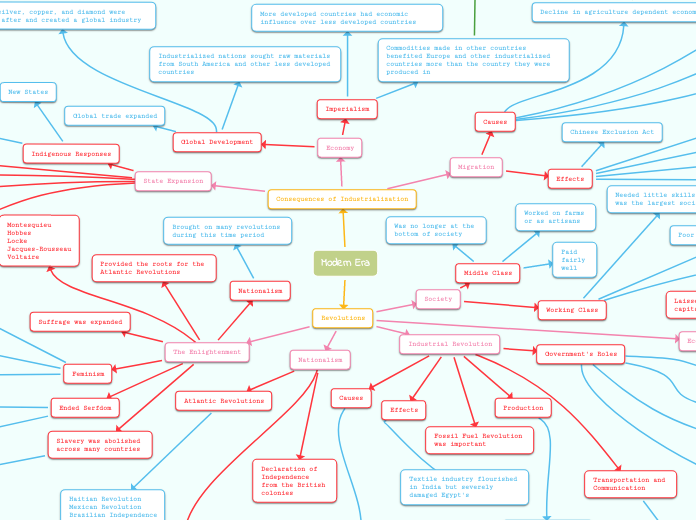par Talia Arris Il y a 4 années
296
Modern Era

par Talia Arris Il y a 4 années
296

Plus de détails
White Australia Policy
Chinese Exclusion Act
Cultures and traditions started to blend together
Italians in North and South America
Irish in North America
Indians in East and Southern Africa, and Southeast Asis
Chinese in Southeast Asia, the Caribbean, South America, and North America
Ethnic enclaves formed
Women took on more roles in society as men migrated for work
Relocated to the U.S., South America, and parts of Europe
Political instability and unrest
Japanese, Lebanese, Italians
Economic opportunities and freedoms
Japanese workers, Lebanese merchants
Decline in agriculture dependent economies
Japanese workers
Commodities made in other countries benefited Europe and other industrialized countries more than the country they were produced in
Opium in Middle East and South Asia Cotton from South Asia and Egypt Oil from the Middle East Copper from Chile Palm Oil from Sub-Saharan Africa
More developed countries had economic influence over less developed countries
Gold, silver, copper, and diamond were sought after and created a global industry
Industrialized nations sought raw materials from South America and other less developed countries
Global trade expanded
New States
Independent states in the Balkans Sokoto Caliphate in Nigeria Cherokee Nation Zulu Kingdom
Rebellions occurred in West Africa, Peru, India, U.S., and Sudan
Needed little skills and was the largest social class
Poor working and living conditions
Worked in industrial factories and coal mines
Was no longer at the bottom of society
Paid fairly well
Worked on farms or as artisans
Haitian Revolution Mexican Revolution Brazilian Independence
Reforms depended on the type of government a country had
Reformed Egypt's economy
Russia forced industrialization to catch up to the western countries
Japan was no longer so isolated
Railroads Steamships Telegraph
Steel Chemicals Electricity Precision Machinery
Textile industry flourished in India but severely damaged Egypt's
Urbanization Improved agricultural productivity Access to waterways Coal, iron, and timber Access to foreign resources Accumulation of Capital
Seneca Falls Conference
Women's right to vote and holding equal power in politics and the economy
Olympe de Gouge
Declaration of the Rights of Woman and of the Female Citizen
Covered an array of rights women should have
Mary Wollstonecraft
Women should receive the same education as men
Human rights movements
Advancements in the economy
Occurred mostly because industrialization decreased the amount of slave labor needed
Brought on many revolutions during this time period